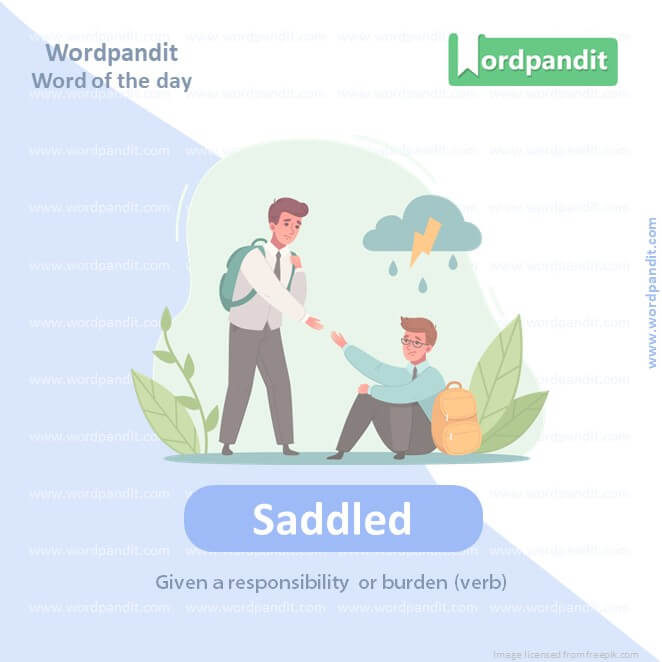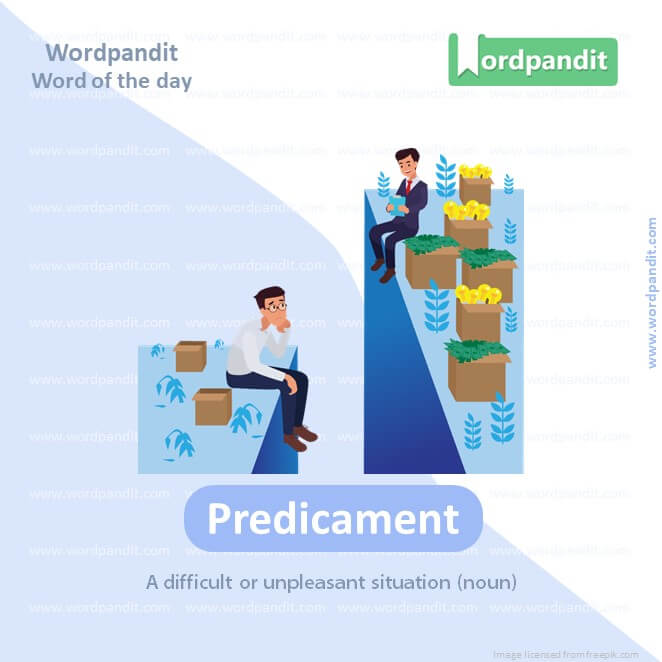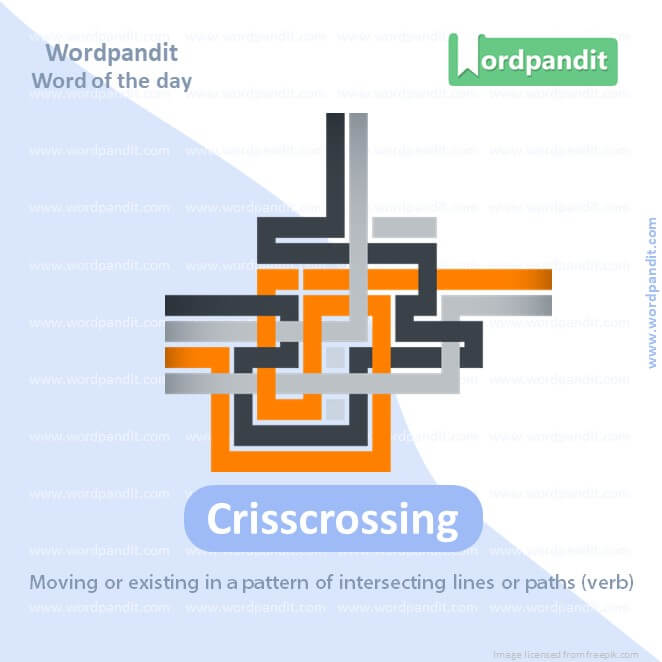Daily Vocabulary Words: List of Daily Used Words
Hi there. Welcome to this special section @ Wordpandit.
Our endeavour here is straightforward: highlighting important daily vocabulary words, you would encounter in The Hindu. This is your repository of commonly used words; essentially, we are posting a list of daily used words. Hence, this has significant practical application as it teaches you words that are commonly used in a leading publication such as The Hindu.
Visit the website daily to learn words from The Hindu.

WORD-1: Saddled
CONTEXT: leaving growers saddled with large stocks of the new-season variety, farmers and millers said.
SOURCE: The Hindu
EXPLANATORY PARAGRAPH: Imagine you have a horse, and you want to ride it. Before you can ride, you need to put a special seat on it called a saddle. Now, if someone says you’re “saddled” with something, it’s like saying they’ve given you a big bag to carry, or a responsibility that you have to deal with.
MEANING: Given a responsibility or burden (verb)
PRONUNCIATION: Sad-dulled
SYNONYMS: Burdened, laden, loaded, entrusted, encumbered, weighed down, tasked
USAGE EXAMPLES:
1. She was saddled with too much homework over the weekend.
2. After the manager left, John was saddled with the entire project.
3. The team felt saddled by the expectations placed on them.
4. I hate being saddled with chores every Saturday.

WORD-2: Predicament
CONTEXT: Farmers find themselves in a frustrating predicament,” said a leading exporter who asked not to be named.
SOURCE: The Hindu
EXPLANATORY PARAGRAPH: Imagine being stuck between two big rocks and you don’t know how to get out. That’s a tough situation, right? A predicament is like that – a difficult or tricky situation that you’re in.
MEANING: A difficult or unpleasant situation (noun)
PRONUNCIATION: Pree-di-ka-ment
SYNONYMS: Dilemma, quandary, jam, bind, pickle, tight spot, plight
USAGE EXAMPLES:
1. Sarah found herself in a predicament when she forgot her homework.
2. The stranded hiker was in a serious predicament.
3. Without an umbrella in the rain, he was in quite the predicament.
4. The detective’s predicament was choosing between two suspects.

WORD-3: Metastasize
CONTEXT: the humanitarian crisis unfolding in the Gaza Strip and fears that the Israel-Hamas war could metastasize into a broader regional conflict.
SOURCE: The Hindu
EXPLANATORY PARAGRAPH: Imagine you have a small puddle of water. Now, if that water starts to spread everywhere and make other puddles, it’s like the word “metastasize.” We use it to talk about how sickness, like bad cells, can spread in the body.
MEANING: Spread to other parts of the body, usually referring to disease (verb)
PRONUNCIATION: Meh-tas-ta-size
SYNONYMS: Spread, propagate, expand, proliferate, migrate, diffuse, disperse
USAGE EXAMPLES:
1. It’s important to catch the disease before it can metastasize.
2. The doctors were concerned that the cancer might metastasize.
3. Early treatment can prevent the tumor from metastasizing.
4. The objective is to target the cells before they metastasize.

WORD-4: Retaliatory
CONTEXT: surprise attacks on Israel that left 1,400 dead and retaliatory strikes that have killed at least 2,778 Palestinians.
SOURCE: The Hindu
EXPLANATORY PARAGRAPH: Imagine if someone took your toy and in response, you took their toy. That’s a way of getting back at them, right? “Retaliatory” is a fancy word that means doing something to get back at someone because they did something to you first.
MEANING: Done as a response to a harmful action, especially as revenge (adjective)
PRONUNCIATION: Reh-tal-ee-uh-tory
SYNONYMS: Vengeful, avenging, retributive, vindictive, revengeful, responsive, reactionary
USAGE EXAMPLES:
1. The country launched a retaliatory strike.
2. He was worried about possible retaliatory measures from his rival.
3. The team made a retaliatory play after the opposing side’s foul.
4. The move was seen as retaliatory in nature.

WORD-5: Crisscrossing
CONTEXT: He has been crisscrossing the Middle East with stops in Jordan, Bahrain, Qatar, Egypt, Saudi Arabia and the United Arab Emirates.
SOURCE: The Hindu
EXPLANATORY PARAGRAPH: Imagine drawing lots of lines on a paper, some going up and down, some going left and right, all over the place. That’s what “crisscrossing” means. It’s like making a pattern of crossed lines everywhere.
MEANING: Moving or existing in a pattern of intersecting lines or paths (verb)
PRONUNCIATION: Kriss-kross-ing
SYNONYMS: Intersecting, traversing, overlapping, weaving, zigzagging, latticing, crossing
USAGE EXAMPLES:
1. There were crisscrossing paths in the garden.
2. The detective was crisscrossing the city in search of clues.
3. Ribbons were crisscrossing the gift box.
4. She spent her summer crisscrossing Europe.
WORD-6: Vehicular
CONTEXT: harvesting and transportation. Also, rains slow vehicular movements.
SOURCE: The Hindu
EXPLANATORY PARAGRAPH: You know cars, trucks, and buses? They’re all vehicles. So, when we say something is “vehicular,” we mean it has to do with vehicles, like cars and trucks.
MEANING: Relating to a vehicle, especially motor vehicles (adjective)
PRONUNCIATION: Vee-hik-yoo-lar
SYNONYMS: Automotive, motorized, car-related, transportational, mobile, carborne, motored
USAGE EXAMPLES:
1. The city introduced new vehicular regulations.
2. They were studying vehicular pollution in urban areas.
3. The bridge has a separate lane for vehicular traffic.
4. Vehicular accidents have decreased due to stricter laws.
WORD-7: Vigorous
CONTEXT: Suppliers’ group OPEC sees India’s oil demand expanding on average by 2,20,000 barrels per day on the back of vigorous economic growth.
SOURCE: The Hindu
EXPLANATORY PARAGRAPH: Imagine you’re running super fast on the playground, using all your energy and strength. That’s being “vigorous!” It means doing something with a lot of power and energy.
MEANING: Full of energy and strength (adjective)
PRONUNCIATION: Vig-or-us
SYNONYMS: Energetic, lively, robust, dynamic, spirited, forceful, powerful
USAGE EXAMPLES:
1. The plants need a vigorous watering in this heat.
2. He gave a vigorous defense of his actions.
3. The team played a vigorous game last night.
4. She’s in her 70s but remains vigorous and active.
WORD-8: Rationale
CONTEXT: BJP MLAs led by Leader of Opposition Suvendu Adhikari questioned the rationale of the introduction of the Bill amidst the Durga Puja festivities in the State.
SOURCE: The Hindu
EXPLANATORY PARAGRAPH: Imagine you have a toy and your friend asks you why you bought it. You might say, “Because it’s fun and I like its color.” That reason you give is called “rationale.” It’s a fancy word for explaining why you did something or why something is a certain way.
MEANING: A reason or explanation for a decision or action (noun)
PRONUNCIATION: Rash-uh-nal
SYNONYMS: Reason, basis, justification, grounds, explanation, motive, cause
USAGE EXAMPLES:
1. What’s the rationale behind your decision?
2. She provided a clear rationale for the new policy.
3. His rationale was based on years of research.
4. I don’t understand the rationale of that move in the game.
WORD-9: Defamatory
CONTEXT: Moitra has slapped a legal notice to both BJP MP Nishikant Dubey and her ex-partner advocate Dehadrai for making ‘defamatory’ allegations
SOURCE: The Hindu
EXPLANATORY PARAGRAPH: Imagine someone saying something that isn’t true about your friend and it makes others think badly of them. That’s not nice, right? When someone says something untrue and harmful about someone, it’s called “defamatory.”
MEANING: Damaging the good reputation of someone by saying untrue things (adjective)
PRONUNCIATION: Deh-fam-uh-tory
SYNONYMS: Slanderous, libelous, calumnious, derogatory, pejorative, disparaging, injurious
USAGE EXAMPLES:
1. The article was seen as defamatory toward the mayor.
2. She filed a lawsuit over the defamatory statements.
3. It’s important to avoid making defamatory remarks.
4. The celebrity faced several defamatory claims this year.
WORD-10: Intensified
CONTEXT: Trinamool Congress MP Mahua Moitra intensified, with Ms. Moitra serving a legal notice to Mr. Dubey and advocate Jai Anant Dehadrai who supplied the alleged evidence against her.
SOURCE: The Hindu
EXPLANATORY PARAGRAPH: Imagine listening to music and someone turns up the volume really high. The music gets louder, right? That’s like the word “intensified.” It means something has become stronger or more extreme.
MEANING: Become or made stronger or more extreme (verb)
PRONUNCIATION: In-ten-si-fied
SYNONYMS: Amplified, heightened, strengthened, magnified, boosted, escalated, deepened
USAGE EXAMPLES:
1. The rain intensified throughout the day.
2. His anger intensified when he heard the news.
3. The colors in the painting intensified with the setting sun.
4. As the night wore on, their search efforts intensified.
Vocabulary Grammar
The journey of language mastery is a thrilling blend of words and structure, often referred to as ‘vocabulary grammar’. These critical components of any language work hand in hand to facilitate meaningful communication. However, embracing ‘vocabulary grammar’ requires a nuanced understanding and a strategic learning approach.
The initial step towards understanding ‘vocabulary grammar’ is to study the functionality of words in a sentence. Grammar holds the key to how vocabulary is structured in language. Therefore, observe how words change or influence meaning when placed differently in a sentence.
Leveraging diverse resources is a great way to grasp ‘vocabulary grammar’. Engage with a range of reading materials, audio-visual resources, and interactive language apps. This offers genuine exposure to ‘vocabulary grammar’ in real-world contexts and enhances comprehensive learning.
While learning ‘vocabulary grammar’, it’s important to see vocabulary and grammar as interconnected. Understanding how different parts of speech function can help in the effective usage of vocabulary. Try creating your own sentences using new vocabulary following certain grammatical rules to reinforce learning.
Revision holds its due significance in mastering ‘vocabulary grammar’. Regular review of learnt grammar rules and vocabulary ensures long-term retention and bolsters understanding. Use techniques like spaced repetition to make your review sessions more effective.
Lastly, practicing ‘vocabulary grammar’ is key to cementing your knowledge. Whether it is through writing exercises or conversing in the language, practicing allows you to apply ‘vocabulary grammar’ in a practical context and aids in accurate language use.
In conclusion, understanding ‘vocabulary grammar’ calls for conscious observation, diversified resources, interconnected learning, regular revision, and relentless practice. As you navigate this path, you will see ‘vocabulary grammar’ like two sides of the same coin, both essential to the value it holds in the wealth of language learning.











